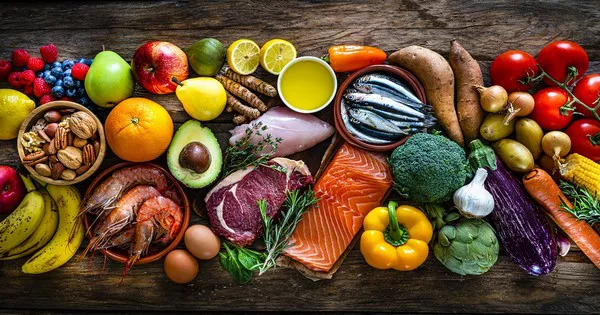Vitamins play a crucial role in maintaining overall health and well-being, supporting various physiological functions within the body. These essential nutrients are classified into two main groups: fat-soluble and water-soluble vitamins. In this article, we will focus on fat-soluble vitamins, exploring their characteristics, functions, dietary sources, absorption, and potential risks associated with their intake.
[inline_related_posts title=”SEE ALSO” title_align=”left” style=”list” number=”3″ align=”none” ids=”1228,1096,979″ by=”categories” orderby=”rand” order=”DESC” hide_thumb=”no” thumb_right=”no” views=”no” date=”yes” grid_columns=”1″ post_type=”” tax=””]
What are Fat-Soluble Vitamins?
Fat-soluble vitamins are a group of organic compounds that dissolve in dietary fats and oils. Unlike water-soluble vitamins, which dissolve in water and are easily excreted through urine, fat-soluble vitamins are stored in the body’s fatty tissues and liver. This storage mechanism allows the body to access these vitamins when dietary intake is inadequate, making them available during times of scarcity.
SEE ALSO: Which Vitamins Are Water-Soluble: A Complete Overview
There are four main fat-soluble vitamins:
1. Vitamin A (Retinol)
Vitamin A is essential for maintaining healthy vision, immune function, and the integrity of skin and mucous membranes. It also plays a role in cell differentiation and growth. Vitamin A is found in two primary forms in the diet: preformed vitamin A (retinol) from animal sources and provitamin A carotenoids from plant sources.
Foods Rich in Vitamin A
Liver (beef, pork, chicken)
Fish liver oils (cod liver oil)
Dairy products (milk, cheese, butter)
Eggs
Orange and yellow fruits and vegetables (carrots, sweet potatoes, mangoes)
Dark leafy greens (spinach, kale)
Health Risks of Excess Vitamin A
Excess vitamin A intake can lead to symptoms such as nausea, dizziness, and in severe cases, liver damage and bone abnormalities.
Who May Be at Risk of Vitamin A Deficiency?
Deficiency can occur in individuals with malabsorption issues, those with limited dietary intake of vitamin A-rich foods, and those suffering from certain liver diseases.
Interactions Between Medications and Vitamin A
Retinoids and Isotretinoin: These medications, used to treat certain skin conditions, are related to vitamin A and can increase the risk of vitamin A toxicity when taken concurrently with vitamin A supplements or large amounts of vitamin A-rich foods.
Cholestyramine: This medication used to lower cholesterol levels may reduce the absorption of fat-soluble vitamins, including vitamin A, as it interferes with bile acid recycling.
2. Vitamin D (Calciferol)
Vitamin D is often referred to as the “sunshine vitamin” because the skin can synthesize it when exposed to sunlight. This vitamin is vital for maintaining proper bone health by promoting calcium absorption in the intestines. Additionally, it supports immune function and plays a role in cell growth and differentiation.
Foods Rich in Vitamin D
Fatty fish (salmon, mackerel, sardines)
Fish liver oils (cod liver oil)
Fortified dairy products (milk, yogurt, cheese)
Fortified orange juice and breakfast cereals
Egg yolks
Beef liver
Health Risks of Excess Vitamin D
Overconsumption of vitamin D can cause hypercalcemia (high levels of calcium in the blood), leading to symptoms like nausea, weakness, and kidney stones.
Who May Be at Risk of Vitamin D Deficiency?
People with limited sun exposure, older adults, individuals with malabsorption issues (e.g., celiac disease), and those with dark skin may be at a higher risk of vitamin D deficiency.
Interactions Between Medications and Vitamin D
Corticosteroids: Prolonged use of corticosteroids can decrease calcium absorption, leading to potential vitamin D deficiency and impaired bone health.
Orlistat: This weight loss medication can decrease the absorption of fat-soluble vitamins, including vitamin D, due to its effect on fat absorption.
3. Vitamin E (Tocopherol)
Vitamin E is a potent antioxidant that protects cells from oxidative damage caused by free radicals. It plays a vital role in maintaining healthy skin, vision, and immune function. Nuts, seeds, vegetable oils, and green leafy vegetables are excellent sources of vitamin E.
Foods Rich in Vitamin E
Nuts (almonds, hazelnuts, peanuts)
Seeds (sunflower seeds, pumpkin seeds)
Vegetable oils (sunflower oil, wheat germ oil, safflower oil)
Green leafy vegetables (spinach, kale, Swiss chard)
Fortified cereals
Health Risks of Excess Vitamin E
Vitamin E toxicity is rare and is usually associated with excessive supplement intake. Symptoms may include gastrointestinal issues and an increased risk of bleeding.
Who May Be at Risk of Vitamin E Deficiency?
Deficiency is rare but may occur in individuals with fat malabsorption disorders or genetic conditions that impair vitamin E metabolism.
Interactions Between Medications and Vitamin E
Anticoagulants (Warfarin): High doses of vitamin E supplements may increase the risk of bleeding, especially when taken in combination with anticoagulant medications. It is essential to monitor vitamin E intake if you are taking these medications.
Orlistat: As with vitamin D, orlistat can also interfere with the absorption of fat-soluble vitamins, including vitamin E.
4. Vitamin K (Phylloquinone and Menaquinones)
Vitamin K is crucial for blood coagulation, ensuring proper clotting to prevent excessive bleeding. Additionally, it is involved in bone metabolism and may play a role in promoting bone health.
Foods Rich in Vitamin K
Green leafy vegetables (kale, spinach, broccoli)
Vegetable oils (soybean oil, canola oil)
Natto (fermented soybean product)
Brussels sprouts
Asparagus
Prunes
Health Risks of Excess Vitamin K
There is limited evidence of vitamin K toxicity from dietary sources. However, high doses of vitamin K supplements may interfere with certain medications like blood thinners.
Who May Be at Risk of Vitamin K Deficiency?
Newborns are often given a vitamin K injection at birth to prevent bleeding disorders since breast milk is relatively low in vitamin K.
Interactions Between Medications and Vitamin K
Anticoagulants (Warfarin): Vitamin K plays a crucial role in blood clotting, and when taken in excess, it can reduce the effectiveness of anticoagulant medications like warfarin. Consistent vitamin K intake is essential for those taking anticoagulants, and any changes in vitamin K intake should be discussed with a healthcare provider.
Absorption and Transport
The absorption of fat-soluble vitamins primarily takes place in the small intestine. Since these vitamins are lipophilic, they require dietary fats for proper absorption. Once absorbed, they are incorporated into chylomicrons, which are large particles that transport dietary fats and fat-soluble vitamins through the lymphatic system and eventually into the bloodstream.
Factors Affecting Absorption
Several factors can influence the absorption of fat-soluble vitamins:
1. Dietary Fat Intake: Insufficient dietary fat intake may lead to decreased absorption of fat-soluble vitamins.
2. Gastrointestinal Disorders: Certain gastrointestinal conditions, such as Crohn’s disease or celiac disease, may impair the absorption of fat-soluble vitamins.
3. Bile Production: Adequate bile production is essential for the absorption of fat-soluble vitamins, particularly vitamin A.
4. Liver Function: Since fat-soluble vitamins are stored in the liver, liver dysfunction may affect their storage and release.
Storage and Utilization
The body can store fat-soluble vitamins in the liver and adipose tissues for more extended periods compared to water-soluble vitamins, which are rapidly excreted. This storage capacity helps maintain a steady supply of these vitamins, even during periods of limited dietary intake. However, excessive intake of fat-soluble vitamins through supplements can lead to toxic levels, causing potential health problems.
Conclusion
Fat-soluble vitamins are essential nutrients that play crucial roles in maintaining various bodily functions. Adequate dietary intake, along with balanced nutrition, is key to ensuring proper levels of these vitamins. While deficiencies are rare, excessive intake of fat-soluble vitamins through supplements should be avoided to prevent potential health risks. As with any nutritional concern, it is always best to consult with a healthcare professional before making significant changes to your diet or supplement regimen.
[inline_related_posts title=”Related Topics” title_align=”left” style=”list” number=”3″ align=”none” ids=”1199,1101,937″ by=”categories” orderby=”rand” order=”DESC” hide_thumb=”no” thumb_right=”no” views=”no” date=”yes” grid_columns=”1″ post_type=”” tax=””]


































